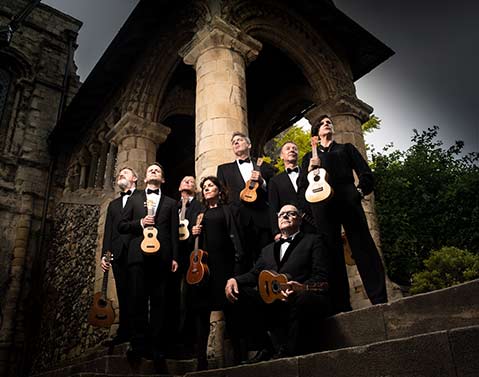Ukulele Orchestra of Great Britain to Play Campbell Hall Holiday Show
Hugely Popular Ukulele Cover Band Will Play Timeless Crowd-Pleasers

So many of us think we’re too busy, too clumsy, or too damn old to learn music; and even if we play, we’re often too self-conscious to let loose in public. On December 15, the Ukulele Orchestra of Great Britain invites everyone to kick those nerves to the curb and sing or strum along during their holiday show. Bring your own uke; video tutorials are online, and beginners are welcome.
For 30 years, the rowdy and talented Ukulele Orchestra — the Harlem Globetrotters of the ukulele world — has covered timeless crowd-pleasers, from “Psycho Killer” to “Smells Like Teen Spirit” to the theme from Shaft, with their bite-sized packages of four-stringed entertainment. But their shows aren’t gimmicks. Queen Elizabeth is a fan, and they sell out Carnegie Hall. Ahead of their Santa Barbara performance, founding member George Hinchliffe answered email questions via Siri, a first for us.
You guys are wizards on the ukulele but make the instrument so approachable. Does that inspire others to play? We know ukulele makers and music shop owners who tell us about the reactions to our show, and it seems many people see it and say to themselves, “That looks easy. I’m going to get me one of those ukuleles.” There are some musical performers who produce a reaction in the audience of, “They are so virtuosic, that looks difficult — I’m going to throw my instrument away.” We like to have fun.
I know some snobby musicians thumb their nose at your group. Does that upset you? It can be amusing when people look down on our orchestra. For example, when we sold out the Royal Albert Hall in London, some of the classical music press thought we were doing a very interesting, useful, and inclusive sort of thing, but others expressed the opinion that we were dumbing down. It seems to me that when a concert is presented in a lighthearted manner, that simply enables the audience to find an accessible route to the music. The music itself can be very serious, even if there is an amusing element to the show.
People often talk about a ukulele revival, but did it ever really go away? Some people have always played the ukulele, but when we first formed the orchestra in 1985, we hardly knew anybody who played it. Our original intention was to choose an instrument that was not too popular, and indeed [it] was regarded by many people as a toy, so we could use it without any customary platform for working on the aspects of music and entertainment that we were interested in. We thought of it rather like a pencil sketch rather than an oil painting. As the years have gone by, people have started to regard the ukulele differently. Perhaps this is something to do with our work. We certainly hope so.
How did you all get together? We started off as a group of friends who were at the time working in different bands. We formed the orchestra as the antidote to the cult of personality and music business hoopla we didn’t enjoy. I think the group is a little bit like the Flintstones — a troupe of characters who collectively have a coherent and positive message.
What do you enjoy about playing the ukulele compared to other instruments? It’s a miniature version of the world of music. It enables the structure of music to be seen in an easier way than if all the thousands of tone colors available to the symphony orchestra or the synthesizer were at one’s disposal.
How did you pick it up? I was given my first ukulele when I was a little boy because someone owed my father money and couldn’t pay, so they met the debt with goods such as sheets of stainless steel, a model steam engine, and the ukulele.
Who are your personal ukulele heroes? James Hill. Tiny Grimes. Eddie Condon, also. And, of course, Eric Clapton, Jimi Hendrix, and Pete Townshend started out by playing the ukulele.
What advice do you have for fledgling players? My tip for any musician is to learn three pieces of music from start to finish and to be able to play them at any speed. People often play the easy bits fast and slow down for the difficult parts. I would also advise picking three contrasting pieces — something lively, something slow, and something a little unusual.
Any beginner songbooks you recommend? There is a marvelous book written by Will Grove-White in the orchestra. I learned quite a few things that were new to me. Any book by James Hill is worth buying. There’s also Mike Dickison from New Zealand who wrote Kiwi Ukulele. His diagrams of chord shapes and fingering are some of the clearest I’ve seen.
How has American music influenced your group, and how do you stay true to your roots? Much of the music and entertainment that the orchestra experienced in their lives has come from America. Many of us fondly remember the Beverly Hillbillies. Recently, the orchestra performed at Queen Elizabeth’s private 90th birthday party. It turns out the Queen quite likes ukulele music. We are happy to be flying the flag for this international instrument with its origins in Portugal and Madeira, which evolved in Hawai‘i and grew to maturity in America. Our perspective on the instrument is perhaps rather British, but we hope that music is the language which transcends national boundaries and that having a good time is something that anybody can do when playing or listening to the ukulele.
4·1·1
The Ukulele Orchestra of Great Britain will play on Thursday, December 15, at UCSB’s Campbell Hall at 8 p.m. For more information, call (805) 893-3535 or visit artsandlectures.ucsb.edu



